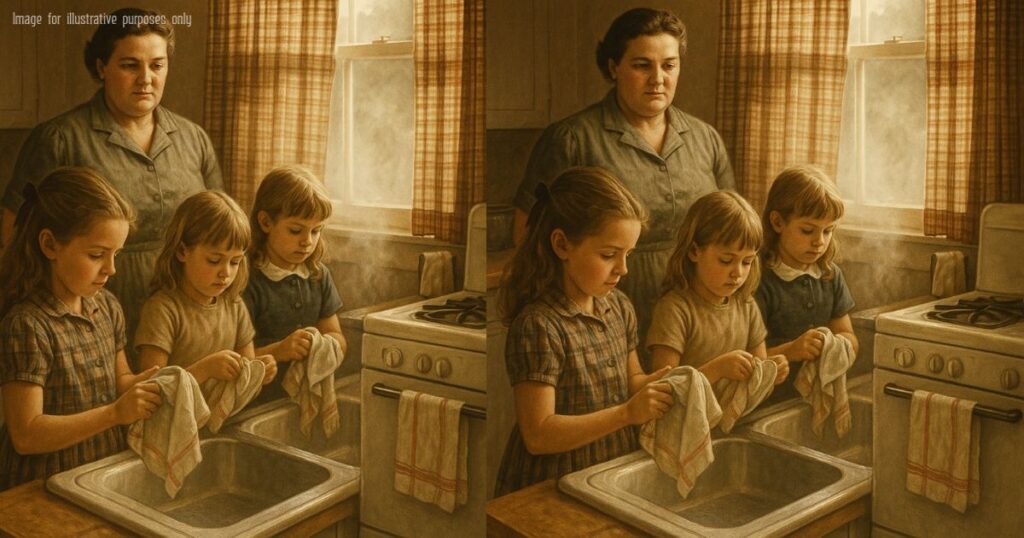She knocked, but didn’t wait for me to answer. Just came right in, like she used to when she was little and didn’t yet believe in privacy.
The boys followed her, each carrying something — a carton of eggs, a loaf of white bread, a gallon of milk with sweat beading down the sides.
“Thought we’d make supper here,” she said, a bit too casual.
I blinked. “Supper?”
“Yeah,” she said, lifting the bag onto the counter. “You always said food tastes better when someone cooks for you.”
I didn’t remember saying that. But maybe I did. Maybe that’s the kind of thing Mama used to say, and I just carried it forward without knowing.
They got to work like it was the most natural thing in the world. Rebecca cracked eggs. Caleb set the table.
The other two argued over whether to use paper napkins or real ones. The kitchen filled with that old noise I thought I’d never hear again — clatter and shuffle and the rising hum of a family figuring things out together.
I just stood there, holding the back of the chair, watching like a ghost in my own home.
When the eggs were scrambled and the toast browned just right, we all sat at the table — the very one where Mama used to serve Sunday pancakes with bacon grease still sizzling. The boys dug in, loud and hungry.
Rebecca passed me a plate and said, “I was thinking, maybe instead of Maplewood, we try something else.”
I raised an eyebrow.
“There’s a program at the community center. Kind of like Meals on Wheels, but more… you know. Social. Group dinners, crafts, even a computer class if you want.”
“A computer class,” I repeated, dry as sand.
She smiled. “Well, maybe not that part.”
We both laughed. Honest laughter, not the polite kind we’d been trading for years.
After dinner, the boys helped with cleanup. Rebecca washed, I dried, and Caleb folded the towel.
He held it up, looked at me. “Like this?”
“Once down,” I said, “then again. Smooth the edges.”
He did, carefully, his brow furrowed in concentration. When he was done, he draped it on the oven handle.
And it was perfect.
They left just before sunset. The boys waving out the back window of the van, Rebecca mouthing, love you, Mom, like it wasn’t something we’d had to fight so hard to say a few years back.
The house was quiet again, but different this time. Full instead of empty. Still, but not hollow.
I walked into the kitchen and turned off the light.
Then I looked at the towel.
It hung there, folded with intention and care — not by me, but by my grandson.
It hit me then.
Maybe it was never about the towel itself. Maybe it was about what it stood for — rhythm, pride, belonging. Maybe rituals aren’t about control, but about passing on something no machine can replicate.
Respect.
Memory.
Love, in its quietest form.
The next morning, I got up early. The birds were just starting in the elm trees, and the coffee maker clicked on like it always had. I opened my kitchen drawer and pulled out a stack of old index cards.
On one, I wrote in my own hand:
“The kitchen isn’t closed until the towel is folded.”
I set it by the stove.
Not for me.
For the next one who would stand here someday — grandchild, great-grandchild, neighbor, stranger. Whoever needed to remember that dignity isn’t loud. It doesn’t shout or demand.
Sometimes it’s just a cotton towel on an oven handle.
Folded neat.
Because real love doesn’t need to sparkle — it just needs to stay.


